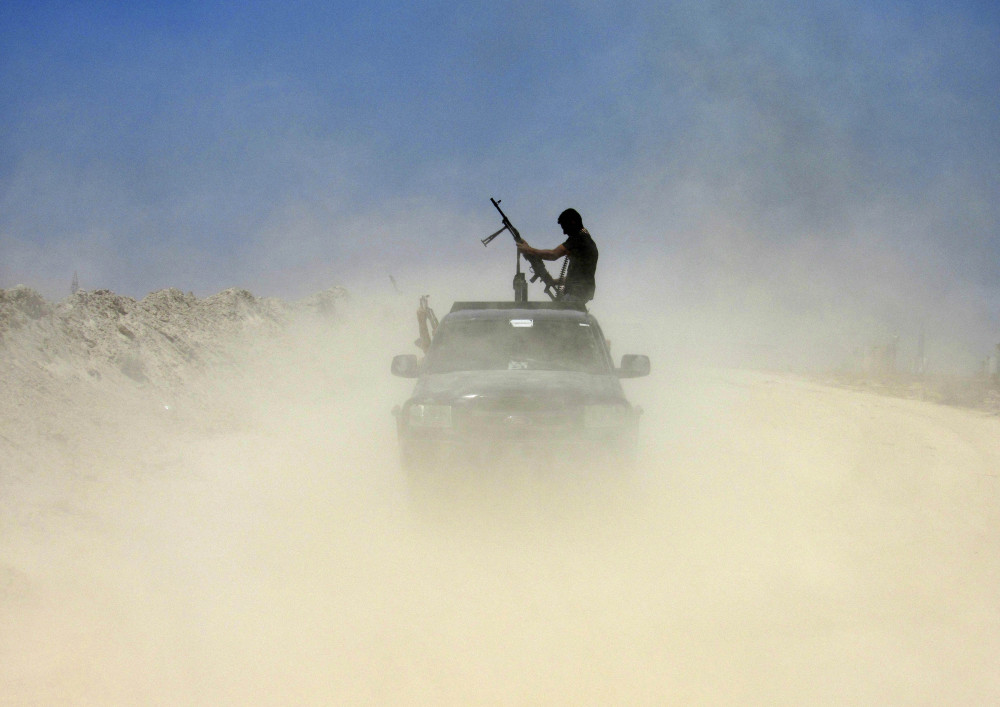BAGHDAD — Five days into an Iraqi military operation to push Islamic State fighters out of Fallujah, residents still inside the city are preparing for a long battle, with some saying they fear being trapped between two forces they don’t fully trust.
More than 50,000 people remain in the center of the Sunni majority city, which has been under control of the extremist group for more than two years. Those who want to leave describe deteriorating humanitarian conditions, but they also say they are wary of the Iraqi government forces who have pledged to liberate them.
Prime Minister Haider al-Abadi announced the start of the offensive late Sunday night. Backed by airstrikes from a U.S.-led coalition, Iraqi forces are tightening their grip around Fallujah and dislodging Islamic State militants from key areas.
“The airstrikes are almost constant,” one man said by phone from inside the city Thursday. The resident, who spoke on condition of anonymity out of concerns for his safety, said that after living for weeks on rice, canned food and processed cheese, those stocks were beginning to run low.
While many in Fallujah welcomed the takeover of the city by the Sunni-led Islamic State group as an alternative to what they considered their marginalization at the hands of Iraq’s leaders, humanitarian conditions in the city have deteriorated under the extremists.
Located 40 miles west of Baghdad, the city has a history of anti-government sentiment in post 2003 Iraq.
After the U.S.-led invasion in 2003 toppled Saddam Hussein, the city’s 250,000 residents initially supported a Sunni insurgency that rose up against U.S. forces and the Shiite-dominated government in Baghdad. Militants from al-Qaida in Iraq fought two bloody battles with U.S. troops in Fallujah in 2004 that killed more than 100 Americans and wounded more than 1,000.
In 2012, Fallujah was the heart of an anti-government protest movement that mobilized tens of thousands across Sunni areas. The demonstrations were sparked by then-Prime Minister Nouri al-Maliki’s increasingly sectarian rule that many Sunnis felt had left them without a voice. Clashes between Iraqi security forces and protesters killed dozens in Fallujah, with thousands of young men arrested.
Shortly after a bloody raid on a Fallujah protest camp in early 2014, Islamic State militants moved in and took over the town. Islamic State later captured the second-largest city of Mosul and then swept toward Baghdad in a blitz that seized nearly a third of Iraq territory.
As Iraqi government troops surrounded Fallujah in summer 2015, residents began reporting increased cases of malnutrition, with the siege preventing food and medicine from entering the city.
This week, as the fighting intensified, food and water are becoming even harder to find, residents said. The Iraqi forces don’t want the militants to escape the city, and coalition officials estimated earlier this week that 500-700 Islamic State fighters remain in Fallujah, nestled among the civilian population.
Iraqi military officials insist that safe “corridors” will be established to allow civilians to flee, but residents say Islamic State-controlled checkpoints along the city’s main roads have made that nearly impossible.
The large number of civilians is already complicating the operation. IS fighters have used civilians as human shields in the past, in some cases forcing families to flee with retreating fighters. The tactic makes airstrikes more difficult.
When the Iraqi military retook Ramadi, IS militants could withdraw to Fallujah, said Christoph Wilcke, an Iraq researcher for Human Rights Watch. But for the militants in Fallujah, “there’s no withdrawal route.”
Wilcke worries that could lead to more civilian casualties.
Copy the Story LinkSend questions/comments to the editors.



Success. Please wait for the page to reload. If the page does not reload within 5 seconds, please refresh the page.
Enter your email and password to access comments.
Hi, to comment on stories you must . This profile is in addition to your subscription and website login.
Already have a commenting profile? .
Invalid username/password.
Please check your email to confirm and complete your registration.
Only subscribers are eligible to post comments. Please subscribe or login first for digital access. Here’s why.
Use the form below to reset your password. When you've submitted your account email, we will send an email with a reset code.